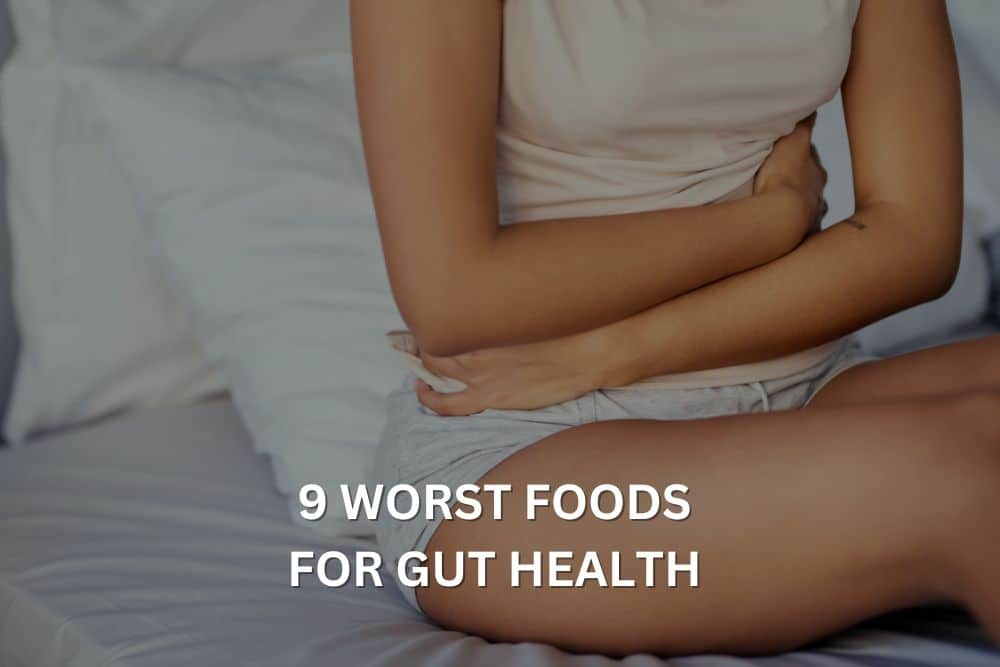
Not many people reaslse that our gut health plays a crucial role in our overall wellbeing, affecting everything from our digestion to our immune system and even our mental health. While many foods can support a healthy gut, others can have a detrimental effect.
Here at 121Dietitian, we address the whole body so when it comes to your unique symptoms you not only have these resolved but feel amazing too.
So you can stay tip-top, this article explores the 9 worst foods for gut health and why they might be causing problems for your digestive system.
- Ultra-Processed Foods
Ultra-processed foods are perhaps the biggest culprits when it comes to poor gut health. These are foods that have been heavily modified from their original state and often contain a long list of unhealthy ingredients, many of which you might struggle to pronounce.
Examples of ultra-processed foods (shop-bought) include:
- Fizzy drinks
- Crisps and savoury snacks
- Mass-produced bread
- Sugary breakfast cereals
- Biscuits and cakes
- Instant noodles and soups
These foods are typically high in processed sugar, unhealthy fats, and artificial additives, while being low in fibre and essential nutrients. They can disrupt the balance of good bacteria in your gut, leading to inflammation and digestive issues.
Moreover, ultra-processed foods often contain emulsifiers, which are additives used to improve texture and shelf life. Some studies suggest that these emulsifiers can negatively affect the gut microbiome and potentially contribute to conditions like inflammatory bowel disease.

2. Fried Foods
While the occasional portion of chips might be a treat, regularly consuming fried foods can wreak havoc on your gut health. Foods that are deep-fried, such as chicken nuggets, doughnuts, and chips, are often cooked in oils that are high in omega-6 fatty acids.
While some omega-6 is necessary for health, an excess can lead to inflammation in the body, including in the gut. Our current intake of Omega 6 to Omega 3 ratio is seriously out of range. Currently Omega 6 to Omega 3 ratio = 16:1 when it should be 4:1
Furthermore, the process of deep-frying creates compounds called advanced glycation end products (AGEs), which can damage the gut lining and contribute to inflammation.
3. Artificial Sweeteners
Many people turn to artificial sweeteners as a way to reduce their sugar intake, but these substances might not be doing your gut any favours. While research is ongoing, some studies suggest that artificial sweeteners can negatively affect the balance of bacteria in your gut.
Common artificial sweeteners include:
- Aspartame
- Sucralose
- Saccharin
These sweeteners pass through your digestive system largely undigested, but they may interact with the bacteria in your gut in ways we don’t fully understand yet. Some research indicates that they might increase the number of bacteria associated with metabolic diseases.
4. Red and Processed Meats
While lean meats can be part of a healthy diet, excessive consumption of red and processed meats has been linked to various health issues, including problems with gut health. Processed meats, such as bacon, sausages, and deli meats, often contain preservatives and additives that can irritate the gut lining.
They’re also typically high in saturated fat, which can promote inflammation in the body. Red meat, when consumed in large quantities, can also have negative effects on gut health. It contains a compound called L-carnitine, which some gut bacteria convert into a substance called TMAO (trimethylamine N-oxide).
High levels of TMAO have been associated with an increased risk of heart disease and other health problems.
5. High-Sugar Foods
Foods high in refined sugar can be particularly problematic for gut health. Excessive sugar consumption can feed harmful bacteria and yeast in the gut, leading to an imbalance in the microbiome.
Some high-sugar foods to be wary of include:
- Sweets and chocolates
- Sugary drinks
- Many breakfast cereals
- Flavoured yoghurts
- Baked goods
Sugar can also contribute to inflammation in the gut and may increase intestinal permeability, sometimes referred to as “leaky gut”.
6. Alcohol
While the occasional drink might not cause significant harm, excessive alcohol consumption can have serious negative effects on gut health. Alcohol can irritate the lining of the gut, potentially leading to increased permeability.
Moreover, alcohol can disrupt the balance of bacteria in the gut, potentially leading to an overgrowth of harmful bacteria. It can also interfere with the production of digestive enzymes, making it harder for your body to break down and absorb nutrients from food.
7. Dairy Products (for some people)
While dairy isn’t inherently bad for everyone’s gut health, it can cause significant problems for people who are lactose intolerant or have a dairy sensitivity. Lactose intolerance occurs when the body doesn’t produce enough of the enzyme lactase to break down the sugar (lactose) in dairy products.
For these individuals, consuming dairy can lead to symptoms like bloating, gas, and diarrhoea. Even for those without a diagnosed intolerance, some people find that reducing dairy intake improves their digestive comfort.
8. Gluten-Containing Foods (for some people)
Similar to dairy, gluten-containing foods aren’t necessarily bad for everyone’s gut health. However, for people with coeliac disease or non-coeliac gluten sensitivity, these foods can cause significant gut issues. Gluten is a protein found in wheat, barley, and rye.
For people with coeliac disease, consuming gluten triggers an immune response that damages the lining of the small intestine. Even for those without coeliac disease, some people find that they digest food more comfortably when they reduce their gluten intake.
9. Caffeine
While many of us rely on our morning coffee to get going, excessive caffeine consumption can have negative effects on gut health. Caffeine can increase acid production in the stomach, which may lead to heartburn or acid reflux in some people.
Moreover, caffeine has a laxative effect, which can be problematic for people with certain digestive issues. It can also interfere with the absorption of certain nutrients, particularly iron.
Overall, it’s worth noting that everyone’s gut is different, and what causes problems for one person might be fine for another. The key is to pay attention to how different foods make you feel and adjust your diet accordingly.
Improving Your Gut Health While avoiding these potentially problematic foods is a good start, improving gut health isn’t just about what you don’t eat – it’s also about what you do eat.
To support a healthy gut further, try to include plenty of:
- Fibre-rich foods: Fruits, vegetables, whole grains, and legumes
- Fermented foods: Yoghurt, kefir, sauerkraut, and kimchi
- Prebiotic foods: Garlic, onions, leeks, and asparagus
- Polyphenol-rich foods: Berries, green tea, and dark chocolate
By being mindful of these potentially problematic foods and focusing on nourishing your gut with beneficial foods, you can take significant steps towards improving your gut health and overall wellbeing.
If you’re experiencing persistent gut health issues, do check us out!
It’s always best to consult with a healthcare professional or a registered dietitian like Gillian Killiner RD. Dietitians provide personalised advice based on your individual needs and health status.
If you want to book your programme TODAY we would love to help you.
You can book a 121 Dietitian Programme today by clicking on the link below
Links included in this description might be Amazon affiliate links. If you purchase a product or service with the links that I provide I may receive a small commission.
